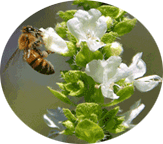Oil of Oregano
© Copyright Bee Wilder April 4, 2015
Cautions:
Unhealthy people cannot handle taking oil of oregano internally (by mouth) since it is very strong and powerful.
If you are taking blood thinning drugs, oil of oregano also thins the blood so please work with your doctor to adjust medications accordingly.
Always dilute oil of oregano with extra virgin olive oil prior to using it; the usual mixture is 50/50 put into a dropper bottle. When used in the mouth it is diluted even more—see Mouth Sores, Abscesses, and Toothaches below.
True Oil of Oregano
Oil of oregano is a completely natural substance derived from wild oregano species. The plant grows in remote mountainous regions free of pollution. Only the leaves of the flowering plant are used. They are picked precisely when the plant is highest in essential oil. Being wild, it is grown chemical-free and the oil is extracted via a completely natural process – no chemicals or solvents are used. The oil is the source of virtually all of the plant’s active ingredients.
There are a wide variety of plants that are confused with oregano, including marjoram, thyme and sage. True oregano grows wild in Mediterranean regions such as Greece and Turkey. Wild oregano is the source of surprisingly potent oil of oregano. The key element in oregano is the oil, which Foster points out in his book “In Herbal Renaissance” “contains carvacrol and thymol as the primary components.” Foster attributes the “fungicidal and worm-expellant properties” of oil of oregano to carvacrol and thymol.
Cass Ingram, D.O., writes in his book “The Cure is in the Cupboard” “these two phenols [carvacrol and thymol] work “synergistically” and that is the reason “oil of oregano” packs a double punch in antiseptic power and explains why it is so potent when taken internally.
Oil of oregano is a powerful pain killer. An article published in Phytotherapy Research describes how oregano oil superseded (came before) anti-inflammatory drugs in reversing pain and inflammation, and is nearly as powerful as morphine as a pain killer.
In his book “Herbal Renaissance,” Steven Foster credits oregano as having “been employed to treat indigestion, diarrhea, nervous tension, insect bites, toothache, earache, rheumatism and coughs due to whooping cough and bronchitis (primarily for it’s antispasmodic effects).” The ancient Greeks were among the first to take advantage of oregano’s medicinal qualities. The Greeks termed the spice origanos, meaning “delight of the mountains.”
Cass Ingram, D.O., has written the book “The Cure is in the Cupboard” that is dedicated to unveiling the health benefits of oregano and oil of oregano. He notes that “wild oregano is a veritable natural mineral treasure-house, containing a density of minerals that would rival virtually any food.”
The wild oregano is rich in a long list of minerals that includes calcium, magnesium, zinc, iron, potassium, copper, boron, and manganese and vitamins C, A (beta carotene), and niacin. Judging from its mineral content alone, it isn’t hard to figure out why oregano is such a valuable commodity.
